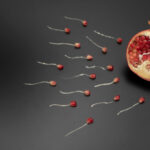If you and your partner are on the journey to parenthood, you’re likely exploring every avenue to maximize your chances of conceiving. One critical but often overlooked factor in male fertility is vitamin D. In this comprehensive guide, we’ll delve into the importance of vitamin D for male fertility, how much you need, and the science behind it all. Let’s embark on this journey to uncover the vitamin D secrets that can potentially enhance your fertility.
Understanding Male Fertility
Contents
- Understanding Male Fertility
- The Significance of Vitamin D
- Recommended Vitamin D Intake
- Vitamin D Deficiency and Male Fertility
- Scientific Evidence and Studies
- Factors Influencing Vitamin D Levels
- Determining Your Vitamin D Status
- Vitamin D Supplementation for Male Fertility
- Real-Life Stories and Experiences
Before we dive into the specifics of vitamin D, it’s crucial to have a grasp of the fundamentals of male fertility.
The Basics of Male Reproductive Health
Male fertility hinges on the production of healthy, motile sperm. The quality and quantity of sperm are crucial for successful fertilization.
Factors Impacting Male Fertility
Male reproductive health can be influenced by a range of factors, including age, genetics, lifestyle choices, and underlying medical conditions. Diet plays a vital role, and that’s where vitamin D comes into play.
The Significance of Vitamin D
Now, let’s explore why vitamin D is essential for male fertility.
The Role of Vitamin D in the Body
Vitamin D is a fat-soluble vitamin that plays a multifaceted role in the body. It’s known for its importance in bone health, immune function, and much more.
How Vitamin D Affects Male Fertility
When it comes to fertility, vitamin D is believed to impact sperm quality and function. It’s thought to play a role in sperm motility, DNA integrity, and hormonal balance.
Recommended Vitamin D Intake
Now that you understand why vitamin D matters, let’s talk about how much you actually need.
Daily Vitamin D Recommendations
The recommended daily intake of vitamin D can vary depending on factors like age, sex, and overall health. Typically, adults need around 600-800 international units (IU) of vitamin D per day.
Variability in Vitamin D Needs
It’s important to note that individual vitamin D requirements can vary. Factors like skin color, sun exposure, and geographical location can all influence your vitamin D needs.
Vitamin D Deficiency and Male Fertility
Low vitamin D levels can be detrimental to fertility. Let’s explore the consequences of vitamin D deficiency.
The Link Between Low Vitamin D Levels and Fertility Issues
Research suggests that men with insufficient vitamin D levels may experience reduced sperm motility and lower sperm count. Vitamin D deficiency has also been associated with other reproductive health issues.
Identifying Vitamin D Deficiency
You can identify vitamin D deficiency through a blood test that measures your serum vitamin D levels. If your levels are below the recommended range, it’s time to take action.
Scientific Evidence and Studies
Now, let’s dive into the scientific studies that support the link between vitamin D and male fertility.
Research on Vitamin D’s Impact on Male Fertility
Numerous studies have explored the relationship between vitamin D and sperm quality. While more research is needed, some findings suggest a positive correlation.
Studies on the Effects of Vitamin D Supplementation
Research has also examined the potential benefits of vitamin D supplementation in improving sperm parameters. These studies provide hope for men looking to enhance their fertility naturally.
Factors Influencing Vitamin D Levels
Understanding the factors that affect your vitamin D levels is crucial.
Sun Exposure and Vitamin D Production
Your skin produces vitamin D when exposed to sunlight. Factors like the time of day, geographical location, and skin pigmentation influence how much vitamin D your body can produce.
Dietary Sources of Vitamin D
In addition to sunlight, you can obtain vitamin D from certain foods, such as fatty fish, fortified dairy products, and supplements.
Determining Your Vitamin D Status
To make informed decisions about your vitamin D intake, you’ll need to determine your current vitamin D status.
Blood Tests to Measure Vitamin D Levels
A simple blood test can measure your serum vitamin D levels, helping you understand whether you have a deficiency or insufficiency.
Interpreting Your Vitamin D Test Results
Your healthcare provider can help you interpret your vitamin D test results and recommend appropriate steps based on your individual needs.
Vitamin D Supplementation for Male Fertility
If you’re deficient or have insufficient vitamin D levels, supplementation may be recommended.
When and How to Consider Vitamin D Supplements
Supplementation should be done under the guidance of a healthcare professional. They can determine the appropriate dosage and duration based on your specific situation.
Potential Risks and Side Effects
While vitamin D supplements are generally safe, it’s essential to be aware of potential risks and side effects, especially when taking high doses.
Real-Life Stories and Experiences
To provide a real-world perspective, let’s hear from individuals who have experienced the impact of vitamin D on their fertility.
Personal Accounts of Men Who Improved Fertility with Vitamin D
John and Daniel both shared their experiences of incorporating vitamin D supplementation into their routines and witnessing positive changes in their sperm quality.
Success Stories and Lessons Learned
Their success stories underscore the potential benefits of optimizing vitamin D levels alongside a balanced diet and a healthy lifestyle.
In your quest to enhance male fertility, don’t overlook the importance of vitamin D. While it’s not a guaranteed solution, the science suggests that maintaining adequate vitamin D levels may positively influence sperm quality and overall reproductive health. Consult with a healthcare professional to determine your vitamin D status and create a plan that aligns with your fertility goals. Remember that a holistic approach, which includes a balanced diet and healthy lifestyle, plays a crucial role in optimizing your chances of parenthood.







